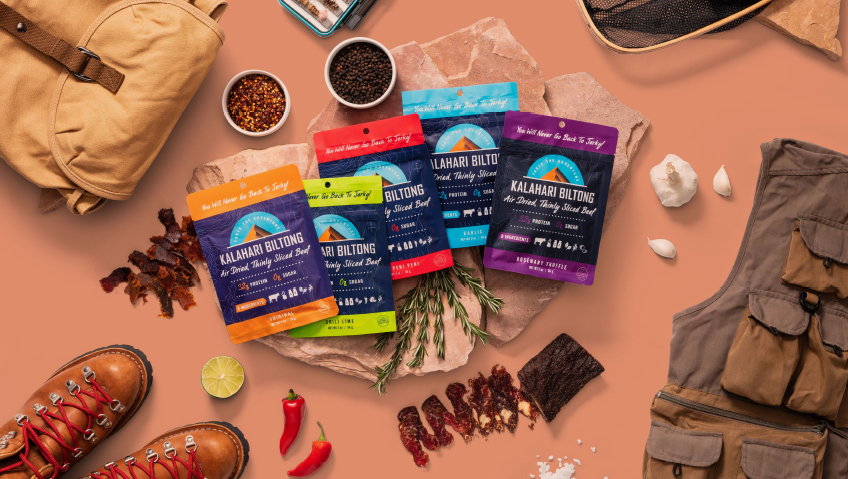Stryve Foods is on a mission to expand the meat snack market. The company offers treats made from beef Biltong—that is, air-dried meat that is packed with protein but lacking in nitrates, sugar, and preservatives. A centuries-old favorite in South Africa, beef Biltong is not yet well-known in the United States, a situation the company is striving to remedy via a lineup of nutritious treats in a variety of flavors and formats.
“Our snack is 100 percent natural and air dried… We naturally allow the moisture to go out of the meat and what you’re left with is pure lean and clean protein,” says Chris Boever, Chief Executive Officer of the Frisco, Texas-based firm.
Beef is misted in vinegar and then seasoned with dry rubs consisting of spices and other natural flavoring. The seasoned meat is not cooked but dried instead in a climate-controlled room at the company’s 50,000-square-foot, United States Department of Agriculture (USDA)-certified processing plant in Madill, Oklahoma. Once properly dried, the meat is cut into slabs, slices, or sticks and packaged in foil pouch bags. The beef is obtained from farms based around the plant and elsewhere.
Stryve offers three main brands: Stryve, Vacadillos, and Kalahari Snacks. Stryve—the company’s flagship brand—comes in original, hickory, and pepper flavors, among others. The Vacadillos brand features a Latin American influence as South and Central America have their own version of air-dried beef, called Carne Seca. Vacadillos snacks have a slightly higher fat content to enhance flavor and come in chipotle honey and habanero varieties. Kalahari Snacks are primarily sold in natural food channels.
According to Boever, Biltong contains 50 percent more protein than leading types of beef jerky, one of the prevailing dried meat snacks in the United States. Unlike Biltong, jerky is cooked and then injected with “water, broth, preservatives, and sugar as well,” he notes.
As one of the only commercial suppliers of beef Biltong in America, Stryve has been on a major growth curve. Its products can now be purchased online or on store shelves at Walmart, Albertsons, H-E-B, Whole Foods Market, Publix, Hy-Vee, Sprouts Farmers Market, Food City, Natural Grocers, CVS, Cub Foods, Wegmans, Love’s Travel Stops, Circle K, and other well-known retailers.
Within the convenience channel, the company counts the Army & Air Force Exchange Service as a key customer. The exchange operates stores, restaurants, and other facilities at military bases and stocks all three brands at its gas stations. The company’s wares are also becoming increasingly popular among people engaged in vigorous outdoor recreational activities like hiking, mountain biking, canoeing, or camping. This is understandable, given that the products weigh less but offer more protein than traditional jerky, says Boever. Stryve also sells Biltong slabs for use on charcuterie boards, a popular snacking and hosting option.
The company is constantly looking at potential new markets, including schools, correctional facilities, and even the Federal Emergency Management Agency (FEMA), the U.S. government department that assists the public during natural disasters. High-protein, easily portable Stryve snacks might be a convenient way to provide sustenance to people displaced by fires, floods, and the like. That said, “Our priority right now is in retail,” Boever states. The goal is to expand into grocery stores and other retail spaces that probably have not sold a lot of beef Biltong in the past. To this end, strategic alliances have been forged.
“Acosta just came on as a partner in January of this year,” says Katie Brenner, Chief Customer Officer. “That shows you their belief in our growth as well. They don’t typically take on new partners that are as small as our company.”
The Acosta Group is a leading marketing and sales agency, and the partnership is expected to increase Stryve’s reach, distribution, and brand visibility.
The company primarily sells within the United States, although there are plans to expand into Canada and further afield, Brenner says.
Being a pioneer in the meat snack sector could be a huge selling point for the firm. While a few people in the U.S. might air-dry beef Biltong as a personal treat, Boever only knows of one other USDA-certified commercial operation in America that manufactures and sells such a product. It is smaller than Stryve and lacks the latter’s forward momentum, he says.
Stryve was founded in late 2017 by Ted Casey, Warren Pala, and two others. Pala, who hails from Johannesburg, South Africa, had grown up with beef Biltong and spent decades creating his own varieties of the snack.
Three of the four founders remain with the firm to this day. Casey is Chairman of the board, while Pala now serves as Stryve’s CBO or ‘chief biltong officer’ in charge of “research, quality, and innovation,” says Boever.
At first, the company sold directly to consumers online. A loyal following was built, but growth was uneven. The summer of 2022 marked the beginning of a transformation. Food sector professionals including Boever and Brenner came on board to add industry knowledge and experience to the founders’ zeal and enthusiasm. Stryve also slimmed down, from hundreds of workers to about 80 today, and its range of products was reduced.
“We had to get smaller to get bigger. We had so many different [stock keeping units], and we were in categories we shouldn’t have been in. We had a nutrition business, with pre-workout and post-workout [products] that really wasn’t our forte. We had to simplify the portfolio,” Boever recalls.
As part of the transformation, operating expenses were reduced and quality enhanced. Gaining USDA certification for meat processing required a lot of time, resources, and money—the company “had to go through lots of trials, and meat is expensive,” notes Boever—but is clearly a source of pride for Stryve staff.
The transformation entailed new packaging and positioning as well. Package design became more colorful, and new bags that “lock in freshness much better,” were introduced, he says.
Stryve also changed the wording on its packaging from Beef Biltong to ‘thinly sliced steak.’ It is an accurate descriptor and refers to a cut of meat that is immediately familiar to consumers. The steak focus has given rise to some snappy marketing slogans: ‘Eat steak, don’t be a jerky!’ for the Stryve brand; ‘Adios jerky, Hola steak!’ for Vacadillos; and ‘Hello Biltong, goodbye jerky!’ for Kalahari.
While the transformation involved reducing product numbers, the company maintains a pet food business built around human-grade, all-natural beef treats. Originally called Two Tails, this branch of the business is in the process of being revamped and renamed.
While it is possible to air-dry other meats, Stryve plans to stick with beef for now to avoid the risk of cross-contamination at its processing plant. Huge retrofits at the Madill facility would be required to introduce non-beef options in a risk-free fashion.
Stryve still offers online sales through its own channels and sites such as Amazon, where slabs of Biltong for charcuterie boards represent the top-selling online product. Internet sales, however, are only one portion of the firm’s current marketing efforts.
Promotion is handled through social media, digital and business-to-business marketing, and attendance at trade shows. At trade shows, Stryve promotes its products through the tried-and-true method of giving out free samples. Letting people taste its products is a good way to educate consumers who are probably unaware of beef Biltong.
Stryve, of course, is not solely focused on the bottom line. The company works with a charitable initiative called Folds of Honor that offers scholarships to families of lost or fallen soldiers or first responders. Since 2007, the organization has provided over 50,000 educational scholarships. “There are lots of veterans in the country. It’s a great way to give back and also to gain a lot of awareness for our product,” says Boever, who sits on the organization’s board of directors.
Going forward, there are plans to consolidate the core offerings and expand distribution, and Stryve officials are exuberant about the future of the firm.
“We want to help the category expand. We want to give the consumer the healthiest, best protein snacks that can be delivered. I want to exceed the expectations of our retail customers and bring more innovation and expansion to this category, to make America healthier and fitter,” says Boever.
“We have three of the fastest-growing brands in meat snacks throughout the United States, whether that’s in dollar sales, unit sales, or velocity, so it’s an incredible time. We have a lot of work to do but we’re excited about our future,” adds Brenner.






